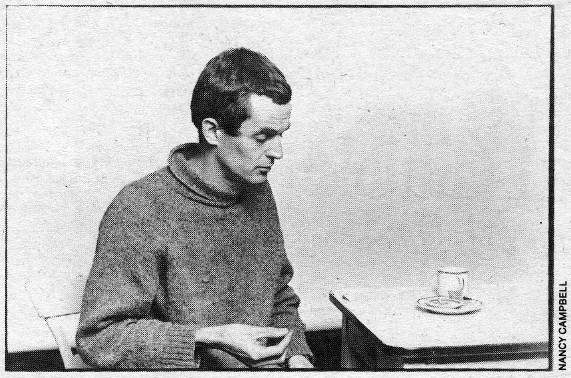Jim Strahs died in Vermont on October 1. I was lucky enough to perform in a play he co-wrote with Richard Maxwell, called Cowboys & Indians, and perform with him in an early version of The Florida Project by Tory Vazquez.
 |
| Jim Strahs in 1982.
I don’t think I knew Jim very well. I wouldn’t say I did if
someone asked. He is among the ten most important writers for me, though. It was in the way he made you keep up with him, the way he
got you to see things that maybe you didn’t want to, at the same time as he
cracked you up.
My first interaction with him was at a party in the loft that a
lot of theater dorks shared, over on Desbrosses street. He leaned over me (not
many people can lean over me) and said, “You’re the guy that married Johanna.”
I said I was. “Smart man,” he barked or croaked, and walked away, saying it
again. “Smart man.” (He was right.)
He hadn’t introduced himself so I had no way of knowing he was the guy who wrote North Atlantic, which, for me, was like an hour and forty-five minutes of perfect time. Maybe that was part of why Jim was such a good match for the Wooster Group – the company has a knack for controlling time in their shows. Jim even said that about Ron Vawter when we were talking once at a Cowboys & Indians rehearsal. “Ronny controlled time,” he said. And of course I had never thought to put it that simply when I tried to explain to people how Vawter had changed my understanding of what live performance could be.
A year or two after Cowboys
& Indians, I would run into Jim every so often, at Amalgamated Bank on
Union Square. I was putting pay in the bank, and he was running an errand
for his gig doing payroll, I think for a labor union. He genuinely liked that job, in a non-condescending, almost
guileless way. It was solid work; he had benefits; he was getting his
teeth fixed.
Those conversations, usually about five minutes each, about
doing payroll and writing plays, were moments I looked forward to because there
was never any guesswork—he was always on the level. And he’d probably never have
used that phrase. He’d have been able to put it more meaningfully, without
doctoring it up. What I mean is that his incredible tone of voice, combined
with what he said, and the way he ranged, physically, made everything that came
from him truer than if anyone else had said it.
I realized the other day that since Jim left New York for Vermont,
and largely checked out of the scene, I had kept a mental image of him up
there, which I would wordlessly check in with every so often. I
thought of him going through old notebooks, sitting in a small place, maybe
depressed, maybe just quiet, writing when the urge hit him, looking out the
window a lot, tracking through notebooks from years ago and thinking about what
of it was worth keeping. Because it's how I knew him, I always see him in his long leather coat, doing
all these things.
I keep him there because it helps me clear away my own
bullshit, sit down again and just put down some words.
It’s easy to fall into clichés talking about a dead
colleague or friend. It’s probably even easier when it’s someone you think of
as an unconscious mentor. God forbid a kind of artistic role model. To get it
out of the way: Jim had so much integrity. There was none of the separation
between him and his language – the body and the word – that happens so
regularly when we try to make a living out of our compulsions or callings. Jim
didn’t bother with that, for all the right reasons.
For people who knew him or had an experience with his writing,
the force of it is titanic. If he kept his focus narrow, it was because each
sentence bore the weight of at least a hundred pounds of reckoning.
I am puzzled as to why Jim’s work has not had more reach. I
think the failing is everyone else’s but his. I keep wondering why there
couldn’t be more room in a larger world for someone like him – someone who’s
never going to glad-hand or kowtow, who’s just going to get each moment. What
do we say to this silence now?
|
